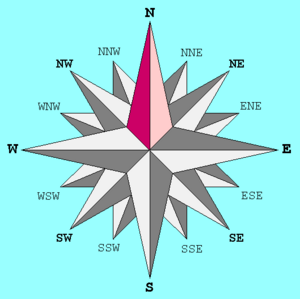North facts for kids
North is one of the four main directions on a compass. It is usually shown at the top of most maps. For example, the United States is north of Mexico, and Mexico is north of Brazil. The North Pole is the farthest north you can go on Earth. People often think of the North as the "top" of the world.
Contents
What is North?
North is a fundamental direction used for finding your way around. It helps us understand where places are located relative to each other. When you look at a map, the top edge usually points North. This makes it easy to orient yourself and plan journeys.
How We Use North
Knowing where North is helps with many things.
- Navigation: Sailors, pilots, and hikers use North to follow routes.
- Mapping: All maps are designed with North at the top, creating a standard way to read them.
- Building: Architects and builders use North to position buildings. This can help with sunlight and energy efficiency.
Finding North
There are several ways to find North.
- Compass: A magnetic compass always points towards Magnetic North.
- Sun: In the Northern Hemisphere, the sun is always in the southern part of the sky at noon.
- Stars: The North Star (Polaris) is almost directly above the North Pole. It is a reliable way to find true North at night.
Types of North
When talking about North, there are actually a few different kinds. Each one is important for specific uses, especially in navigation.
True North
True North is the direction along the Earth's surface towards the North Pole. This is the fixed point where all lines of longitude meet. It never changes. Maps are always aligned with True North.
Magnetic North
Magnetic North is the direction that a compass needle points. This is because the Earth acts like a giant magnet. The North Magnetic Pole is not in the same place as the True North Pole. It slowly moves over time. Navigators must adjust their compass readings to account for this difference. This adjustment is called magnetic declination.
Grid North
Grid North is used on maps that have a grid system. It is the direction of the grid lines that run vertically on a map. For most everyday uses, Grid North is very close to True North. It helps people use coordinates to find exact locations.
The North Pole and Arctic Region
The North Pole is the northernmost point on Earth. It is located in the middle of the Arctic Ocean. The area around the North Pole is called the Arctic.
Life in the Arctic
The Arctic is a very cold place, but it is home to many unique animals.
- Animals: You can find polar bears, seals, walruses, and Arctic foxes.
- People: Indigenous groups, like the Inuit, have lived in the Arctic for thousands of years. They have adapted to the harsh environment.
Climate and Environment
The Arctic plays a big role in the Earth's climate.
- Ice: Much of the Arctic is covered by sea ice and glaciers.
- Climate Change: The Arctic is warming faster than other parts of the world. This causes ice to melt, which affects global sea levels and weather patterns.
See also

- Norte para niños (North for children in Spanish)


